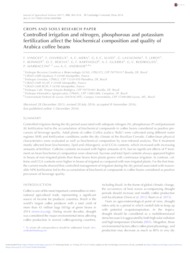Embrapa Cerrados
Controlled irrigation and nitrogen, phosphorus and potassium fertilization affect the biochemical composition and quality of Arabica coffee beans.
Controlled irrigation and nitrogen, phosphorus and potassium fertilization affect the biochemical composition and quality of Arabica coffee beans.
Autoria: VINECKY, F.; DAVRIEUX, F.; MERA, A. C.; ALVES, G. S. C.; LAVAGNINI, G.; LEROY, T.; BONNOT, F.; ROCHA, O. C.; BARTHOLO, G. F.; GUERRA, A. F.; RODRIGUES, G. C.; MARRACCINI, P.; ANDRADE, A. C.
Resumo: Controlled irrigation during the dry period associated with adequate nitrogen (N), phosphorous (P) and potassium (K) fertilization led to the accumulation of biochemical compounds in coffee beans considered as positive pre-cursors of beverage quality. Adult plants of coffee (Coffea arabica?Rubi?) were cultivated using different water regimes (WR) and fertilization conditions under the dry climate of the Brazilian Cerrado. Coffee-bean physical characteristics were evaluated as well as biochemical composition by near-infrared analysis. The K treatment mostly affected bean biochemistry, lipid and chlorogenic acid (CGA) contents, which increased with increasing amounts of fertilizer. Caffeine contents increased with higher amounts of N, but no significant effects of P treatment on bean biochemical composition were observed. Sucrose and total lipid contents always appeared higher in beans of non-irrigated plants than those beans from plants grown with continuous irrigation. In contrast, caffeine and CGA contents were higher in beans of irrigated as compared with non-irrigated plants. For the first time, the current results showed that controlled management of irrigation during the dry period associated with reasonable NPK fertilization led to the accumulation of biochemical compounds in coffee beans considered as positive precursors of beverage quality.
Ano de publicação: 2017
Tipo de publicação: Artigo de periódico
Unidade: Embrapa Cerrados

